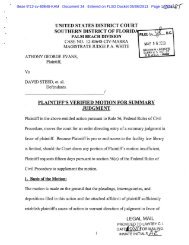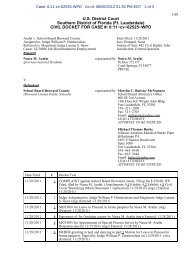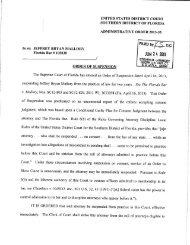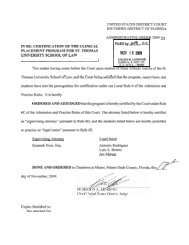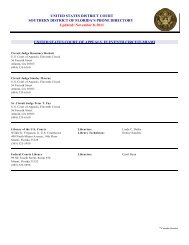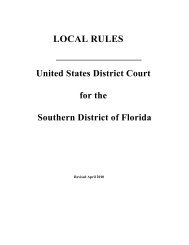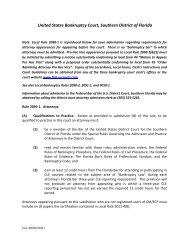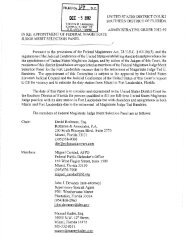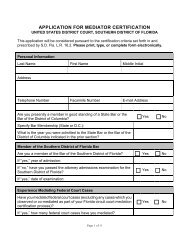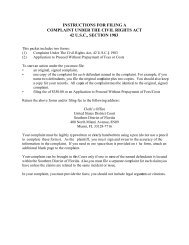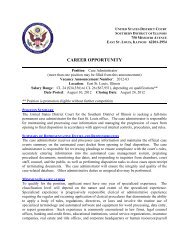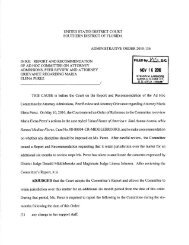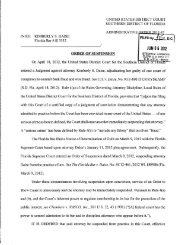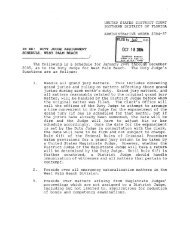JAN j 6 2010 - United States District Court
JAN j 6 2010 - United States District Court
JAN j 6 2010 - United States District Court
You also want an ePaper? Increase the reach of your titles
YUMPU automatically turns print PDFs into web optimized ePapers that Google loves.
conducted until after the expert summary or report required by Local Rule<br />
16.1-:-K(k) is provided.<br />
F. Sanctions. Local Rule 3 0.1 prohibits abusive conduct during<br />
deposition and provides both monetary and procedural sanctions for such<br />
conduct. Prohibited conduct includes "coaching" of witness, improper<br />
instructions not to answer, and off-the-record conferences except for the<br />
purpose of determining whether to assert a privilege.<br />
III. PRODUCTION OF DOCUMENTS, ELECTRONICALLY STORED INFORMATION AND<br />
THINGS<br />
A. Preparation and Interpretation of Requests for Production.<br />
(1) Formulating Requests for Documents, Electronically Stored Information<br />
and Things. A request for documents, electronically stored information<br />
or things, whether a request for production or a subpoena duces tecum,<br />
should be clear, concise and reasonably particularized. For example, a<br />
request for "each and every document supporting your claim" is<br />
objectionably broad in most cases.<br />
(2) Use of Form Requests. Attorneys requesting documents, electronically<br />
stored information or things shall review any form request or subpoena to<br />
ascertain that it is applicable to the facts and contentions of the<br />
particular case. A "boilerplate" request or subpoena not directed to the<br />
facts of the particular case should not be used.<br />
(3) .Reading- and Interpreting Requests for Documents, Electronically-<br />
Stored Information and Things. A request for documents, electronically<br />
stored information or things, or a subpoena duces tecum shall be read or<br />
interpreted reasonably in the recognition that the attorney serving it<br />
generally does not have knowledge of the materials being sought and the<br />
attorney receiving the request or subpoena generally does have such<br />
knowledge or can obtain it from the client. Counsel should be mindful in<br />
producing documents that such things as notes, clips, and other<br />
attachments to documents as kept in the normal course of business should<br />
also be produced.<br />
(4) Oral Requests for Production of Documents, Electronically Stored<br />
Information and Things. As a practical matter, many lawyers produce or<br />
exchange discovery materials upon informal request, often confirmed by<br />
letter. Naturally, a lawyer's word once given, that an item will be<br />
produced, is the lawyer's bond and should be timely kept. Requests for<br />
production may be made on the record at depositions. Depending upon the<br />
form in which they are made, however, informal requests may not support a<br />
motion to compel.<br />
(5) Objections. Absent compelling circumstances, failure to assert<br />
objections to a request for production within the time period for a<br />
response constitutes a waiver of grounds for objection, and will preclude<br />
a party from asserting the objection in a response to a motion to compel.<br />
Objections should be specific, not generalized. See Local Rule<br />
26 . l.G.3.a(cf) (3) (A) .<br />
94



